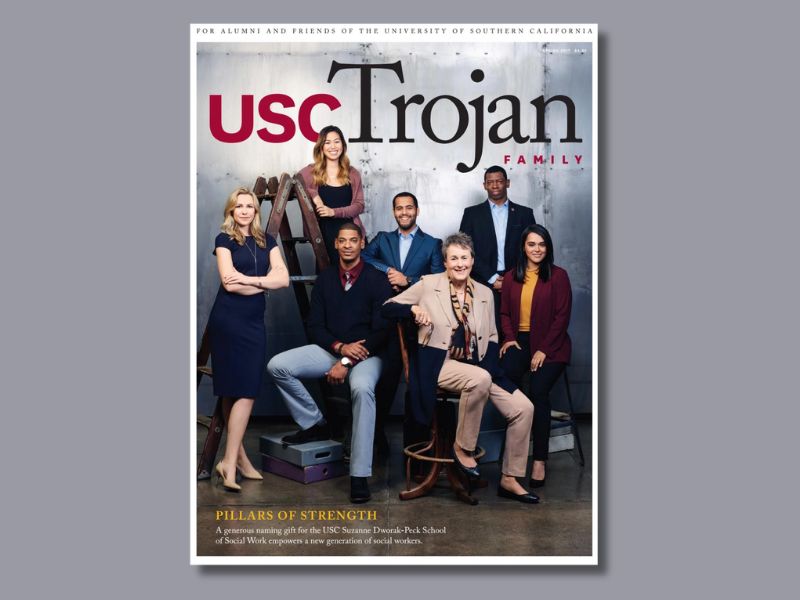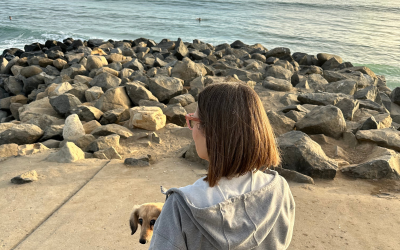Suzanne Dworak-Peck ’65, MSW ’67 first saw a social worker in action on a tour of a Los Angeles County hospital as a USC undergraduate.
Impressed by the woman’s knowledge, ethics and impact on others, the senior psychology major with a penchant for helping people decided she had found her calling.
Dworak-Peck loved her work, but she began to wonder why the profession flew so far below the radar for most people. Growing up, her family, teachers and professors had suggested careers in law or medicine as ways to help others. Social work – a field dedicated to helping individuals, families and groups overcome challenges such as poverty, addiction and abuse – never arose as a career option until that hospital tour.
Social workers, she realized, didn’t just have an image problem. Their profession simply wasn’t top of mind for most people. Maybe it was because social workers often worked in the background, helping others to succeed. Or maybe it was because social workers didn’t have positions of power or influence in national dialogues about social problems. Even in the fictional world of television dramas, social workers were relegated to small-time roles usually involving taking someone’s child away, while doctors and lawyers saved lives and helped people.
Dworak-Peck wanted to change social work’s image, and educate people about the profound impact of the profession on society.
“If we as social workers are going to empower others,” she said. “We must first empower ourselves.”
Last fall, the woman whose dedication to the profession earned her a reputation as the “social worker’s social worker” did just that by donating a historic $60 million to endow and name the USC Suzanne Dworak-Peck School of Social Work. Her gift marked the largest contribution from an individual to a school of its kind.
Dworak-Peck’s donation not only cemented the school’s standing as one of the world’s most innovative institutions within the discipline, it also invested deeply in the school’s and the profession’s future.
“My wish is that this endowment will create greater awareness and understanding about the profound impact of the social work profession,” Dworak-Peck said.
Her generous gift wasn’t the first time Dworak-Peck had aimed to shine the spotlight on the important role of social workers. In addition to advocating for the profession in Sacramento, Washington D.C. and at the United Nations as president of several social work organizations, she also founded a social work experts’ network to consult with media and entertainment organizations on the accurate portrayal of social work on television shows and news networks.
“Suzanne Dworak-Peck is a visionary who has shown extraordinary leadership in her field, almost single-handedly changing how we perceive social workers,” said USC President C.L. Max Nikias. “Her great generosity is matched only by her passion for social justice and her drive to inspire change by reimagining social work so it empowers everyone it touches.”
A School Known for Innovation
As dean of the USC Suzanne Dworak-Peck School of Social Work for more than two decades, Marilyn L. Flynn has overseen the school’s tremendous growth as well as its pioneering work in online education, homelessness and the area of military social work. The largest school of social work in the world and one of the oldest, Dworak-Peck’s alma mater educates one of every 20 master’s-level social workers in the United States and has an alumni network of 15,000.
Dworak-Peck’s gift supports efforts to broaden the school’s impact. “Inspired by Suzanne’s leadership, we will strive to transform the role of the social worker in a way that allows us to influence the work of the public and private sectors to achieve great social good,” Flynn said.
The gift also provides a capstone for the school’s leadership in academic innovation, experiential learning, online education and translational research. The school’s enrollment has tripled since 2010, in part due to its creation of online graduate degree programs that allow students to earn their master’s or doctor of social work, or master of science in nursing from anywhere in the world.
The online program also complements the school’s military social work specialty, launched in 2009 to prepare social workers to treat armed forces members, veterans and military families. The program was the first of its kind at a civilian research university, and the first to use virtual patients to train future social workers.
“Some veterans come out of the military with a drive to serve or be part of something bigger than themselves. They want to become social workers and give back,” said Kimberly Finney, clinical associate professor at the school and head of its military social work specialization.
Eric Woolridge is one of them. An Army vet and current MSW student, he’s working with classmates on a social media project to raise awareness of sexual assault in the military, often unreported and linked to increased likelihood of homelessness and mental disorders.
“As social workers, we are agents of change,” he said. He hopes their effort will help reshape military culture and build safe places for reporting sexual assault. After graduation in 2017, he plans on starting his own business helping veterans in their transition to civilian life.
Coursework and clinical practice related to working with veterans is informed by some of the best research the nation has. The school’s Center for Innovation and Research on Veterans & Military Families (CIR) has developed an outstanding reputation for its comprehensive studies of veterans and their transition to civilian life.
“If you want to know what’s going on with veterans, academics know to contact USC and CIR,” said Finney, who joined the school after 23 years as an Air Force clinical psychologist. “USC has developed a roadmap for how to get veterans reintegrated as productive members of society.”
The Steven A. Cohen Military Family Clinic at USC will allow the school to collect even more data and information, she said, leading to more fact-driven local and national policies and decisions. The new clinic, which opened in fall 2016, offers free care to post-9/11 veterans and families who are suffering from post-traumatic stress and other mental health conditions.
Fighting homelessness on all fronts
Homelessness is a national crisis on the rise in many cities in the West, according the federal government. In Los Angeles the challenge is especially urgent, said Suzanne Wenzel, professor and one of USC’s foremost authorities on homelessness and HIV/AIDS.
L.A. claims the largest homeless population in the nation, with nearly 50,000 people sleeping on streets, in cars or in shelters last year, according to the county. The school is leading a national push, along with New York University, to get social work schools across the nation to prioritize homelessness. Assistant professor Benjamin Henwood steers the effort, called the National Grand Challenge to End Homelessness.
Tackling huge problems like homelessness can start with impactful and rigorous research. Recently, Wenzel, who holds the Richard M. and Ann L. Thor Professor in Urban Social Development, led the research team on an assessment of homeless women’s needs for the Downtown Women’s Action Coalition in Los Angeles. The startling findings: Nearly half of all women living on the street or in shelters had been physically or sexually assaulted in the past year, and 90 percent had been during their lifetime. The groundbreaking study will be used to advocate for additional funding and resources for women experiencing homelessness.
Yet research and advocacy are just a few pieces of the puzzle. Human contact and caring are others. A simple yet profound concept born at the school is a local program called the Nourished Project. Nourished gathers USC students with residents at a permanent supportive housing facility near Koreatown once a week to cook healthy recipes and eat together, sharing stories.
Homeless rights advocate Jack Lahey MSW ‘16, co-founder and program manager of Nourished, said that organizers and volunteers are trying to change people’s lives in a more substantive way than just giving them a meal or trying to meet their immediate needs. They want to build a sense of community. “It can change their perspective on their community and their lives,” he said. Hands-on programs like this also inform and amplify work done by students and faculty in the classroom and as part of field work with vulnerable adults and children.
Big Data
Social work as a profession may have begun in the early 1900s with people of goodwill coming together to help others, but today’s practitioners like Dworak-Peck and others are quick to point out how scientific and evidence-based their work has become.
Marleen Wong MSW ‘71, clinical professor and associate dean of field instruction, helped conduct a series of groundbreaking studies on the prevalence and effect of trauma in Los Angeles schools in the mid-2000s. They found that 90 percent of children living in certain zip codes in L.A. had been exposed to violence—kicked, punched, threatened with a gun or knife, or having witnessed it—within the previous year.
“It was shocking to everyone that the children we studied had higher rates of post-traumatic stress disorder than military returning from the Middle East,” she said.
The series of studies not only drew attention to the issue, but it also led Wong and her colleagues to develop tools for mental health professionals and teachers to help children exposed to violence and trauma. School administrators around the world use the program today, and Wong’s expertise as been sought at the scenes of disasters, including the terrorist attacks in Oklahoma and New York cities and school shootings in Columbine and Newtown.
Studies like those underscore the key role that big data can play in helping vulnerable children and families. Today, technology brings new methods of analysis to the same goals of informing policy decisions and improving services.
Some have called the Children’s Data Network revolutionary, but Jacquelyn McCroskey, the co-director who holds the school’s John Milner Professor of Child Welfare, stops short of describing the collaborative big data project that way.
But she and CDN co-director and associate professor Emily Putnam-Hornstein do envision a day in the future when the network, launched in 2014, brings together data from city and county departments of health, mental health, education, child welfare and corrections to inform policy decisions and improve services for society’s most vulnerable children and families.
A proof-of-concept project they’ve been working on with child care and family services agencies in the San Fernando, Santa Clarita and Antelope Valleys shows the potential, though. Their analysis of data from different agencies found nearly a third of children in subsidized child care were also known to child protective services, uncovering an opportunity for child care providers to better help child victims or witnesses of violence.
For Dworak-Peck, innovation and the application of evidence-based best practices is the key to turning the tide on society’s ills.
“We can’t afford not to invest in social work education,” Dworak-Peck said. “It is time for us to be more strategic about where we direct our energy and our resources, deriving solutions rather than putting expensive band-aids on the problems of the world.”
For USC, her transformational gift has done just that.
Written for Trojan Family Magazine in 2016.





0 Comments